- Home
- Julie Hyzy
State of the Onion Page 5
State of the Onion Read online
Page 5
“What are you talking about?”
I fought my exasperation. “That’s not the same guy from this morning.”
“Sure it is.” Shaking his head, Tom returned his attention to the food and Pepsi on the table before him. “Who else would it be?” he asked. “If they caught some other guy running across the White House lawn this morning, somebody forgot to tell me about it.”
“Tom,” I said, and I waited till he dragged his gaze from the table to meet mine. “Look close. This isn’t the guy from this morning. Whoever sent this tape to the networks changed the guy’s face.”
His blue eyes didn’t waver, but I caught the set of his jaw. Something was up.
I set my hands at my hips. “Why would they do that?”
“You’re seeing things.” He stood, carrying the half-finished plate back to the kitchen. “Quit worrying about stuff that doesn’t concern you.” When he turned to me again, his expressions crinkled into that skeptical look he often wore when we watched the news. “You know how these media people are. They don’t get the footage they want, they create it.”
I pointed to the drama still frozen on my screen. “I was there this morning. This footage is real. It’s just the face that’s fake.”
“Give me a break. You’re seeing things.”
I didn’t have an answer to that, and I said so. I hadn’t been expecting him to laud my observational skills, but I did expect something more than this abject lack of interest. The derision in his tone hurt.
“But…” I persisted, staring at him in disbelief. How he could not be as blown away by this as I was mystified me. My voice went limp. “But I was there.”
And then, it hit me. Tom knew why the news stations were playing this fake tape because he was in on it. He’d known about it from the start. Hence, the disinterest. Hence, the reluctance to watch the tape.
I stared at the flowers. Hence, the “Happy Anniversary” distraction. Damn it, how could I be so dense sometimes?
“There is no Farzad Al-Ja’fari, is there?” I asked, butchering the name from the newscast. “The guy this morning really is called Naveen, and he really is a friend of Craig’s, isn’t he?”
Tom rolled his eyes, licked his lips, and otherwise tried to avoid answering me.
“Just tell me why they faked this news coverage,” I said. “That doesn’t make any sense.”
“Nobody faked any news coverage.”
That was an out-and-out lie and we both knew it. A swift anger washed over me. I knew there were a lot of things Tom couldn’t tell me, but I never expected him to deliver a blatant lie and expect me to swallow it.
“Fine,” I said. “Have it your way. Just tell me one thing. Is he okay?”
“Who?”
“Naveen. I hit him pretty hard. I feel bad about that.”
“Don’t. He was just another loony trying to get close to the president. Maybe he should thank you because you knocked some sense into him.”
“Do you guys have him in custody?”
“We turned him over to the Metropolitan Police. He’s their problem now.”
That very moment, Tom’s pager went off. After checking the numbers he glanced up, met my furious glare, and gave a weak smile. “Duty calls.”
I kept silent as he kissed me on the forehead and turned to leave.
“I’ll call you.”
I nodded and followed him, not wanting this argument to end here—not wanting him to leave while I was angry. Mostly just wanting him to stay to work this out. “Be safe,” I said.
He raised a hand in acknowledgment.
Two seconds later the door shut and my gaze drifted to the vase of flowers. I didn’t understand. I didn’t understand at all.
CHAPTER 5
WE ALL APPLAUDED AS PAUL VASQUEZ CONCLUDED the morning’s surprise announcement. Thanking us for our time, he turned away from the lectern to let the buzz begin. Now that the official presentation was over, everyone relaxed and a few of us stepped forward to meet the most recent addition to our White House staff family.
Head of the newly created cultural-and faith-based Etiquette Affairs department, Peter Everett Sargeant III wore pride in his position like the perfectly pressed, bright red pocket handkerchief that contrasted against his dark Armani suit. Though not especially tall, Sargeant cut an impressive figure. He was just as polished and dignified as Paul, but Sargeant’s deepened crow’s feet and line-bracketed mouth made me believe he had at least ten years on our chief usher.
Shaking hands with Henry, the new guy raked his gaze over all of us kitchen personnel, and with patent curiosity, we watched him right back.
“Actually,” Sargeant said, responding to Henry’s greeting, “I would prefer being addressed as the ‘sensitivity director.’” He drew out his syllables in such careful, round tones that I was reminded of that elocution scene from Singin’ in the Rain. Giving a self-deprecating smile, he added. “It’s so much less cumbersome when addressing me. Don’t you agree?”
Cyan glanced over, lifting her eyebrows and elongating her nose in a hoity-toity expression. I shot her a reproving look. I knew Sargeant had to be nervous and I didn’t want him to catch Cyan’s little joke. I remembered when I’d been presented to the staff. My debut was done with a lot less fanfare—after all I was an assistant chef, not the head of a department—but I’d been awestruck, eager, and hopeful that everyone would like me. I was sure Sargeant felt the same way.
Henry shifted to the side and I thrust my hand forward. “I’m Olivia Paras,” I began.
Sargeant cocked his head to one side. “How tall are you?”
Puzzled, I answered, “Five foot two.”
He turned to Henry. “Isn’t such slight stature a hindrance to keeping the kitchen running efficiently?”
Henry took a moment before answering. His usually jovial face now mirrored the confusion I was feeling, but his cheery demeanor returned in half a beat. He laid a hand onto my shoulder. “When it comes to the kitchen,” he said, beaming, “Ollie here outclasses anyone. And I’m talking even the great chefs of Europe. Ollie may be tiny, but she’s got what it takes.”
Sargeant licked his lips. It was the only movement in his otherwise rigid body. As though he tasted my name and found it bitter, he said, “Ollie.”
My hand still hanging out there, I looked to Henry for guidance, but his pointed glance seemed to warn me that I was on my own. I could almost hear him lecture me that if I were fortunate enough to become the next executive chef, I’d be handling much more prickly situations than this one.
“Right…Ollie,” I said, my voice a little too high, a little too animated. “That’s what everyone calls me.” With the high-voltage confidence I displayed, I decided Mary Poppins couldn’t have done better. And, since Sargeant didn’t look like he was about to shake my still-outstretched hand, I took the initiative and grabbed his. “It’s a pleasure to meet you.”
We shook briefly. He grimaced and dismissed us with a nod.
On the way back to the kitchen, I shook my head. “What were they thinking when they hired this guy?”
“Let’s not be too harsh, Ollie,” Henry said, but when he glanced back at the gathering, he wore the same expression he had the time we realized we’d accidentally left Limburger cheese out all night. “He’s probably just nervous.”
“Maybe,” I conceded.
Cyan rolled her eyes—violet, today. “Look at the guy. He walks like he’s got a pole stuck up his—”
“Cyan!”
She shot Henry an abashed smile. “I’m just glad he doesn’t oversee the kitchen.” She gave a mock shudder. “Can you imagine having to report to someone that stuffy?”
Marcel wasn’t scheduled to come in until the afternoon. I wondered what his take on the new man would be. I suspected I would never get the warm and fuzzies from Peter Everett Sargeant III.
Bucky, trailing behind us, spoke up. “Nothing wrong with running a tight ship.”
Henry’s neck flu
shed red.
“Of course…” Bucky continued, picking up his pace to make it to the kitchen first, “I’m not saying you don’t.” He cast a benevolent smile over his shoulder, but his eyes remained expressionless.
I patted Henry’s back. “He’s just jealous,” I whispered. “That Sargeant guy completely ignored Bucky when he went up to say hello. At least I got an insult out of the deal.”
Henry winked at me. “That you did.”
The president’s lunch today was a special affair. He had morning and afternoon meetings scheduled in-house, so he’d opted for a low-key meal with Mrs. Campbell in the residence. With the limited time the couple spent together alone, we knew we wanted to serve up something memorable.
I drew one of my trusty American-made Mac knives from its holder and went to work. As I chopped crabmeat for the first course, a crab-spinach appetizer served with crostini, Bucky stewed cherry tomatoes for garnish, and Henry and Cyan prepared risotto. I had a supply of truffle oil on hand. I’d add that, and a tiny bit of shaved truffle into the risotto just before serving. A little truffle goes a long way, and we knew that this extravagant addition would be just the right touch for today’s meal.
A sharp rap pulled our attention to a visitor in the doorway.
Peter Everett Sargeant III reminded me of a grouchy squirrel. With his hands positioned as though he were cradling a precious nut, he canted his head three different ways in the space of two seconds. Alert, wary, eager.
“Welcome to our kitchen,” Henry said.
Henry placed emphasis on the word our. I liked that.
“Yes,” Sargeant said. He smiled, looking as though the effort caused him pain. “I’m availing myself of the opportunity to familiarize myself with the layout of the property.” He seemed to take in everything in quick snippets—a tendency that contrasted with the careful cadence of his speech. “And the organizational structure.”
His smile faded when it rested on me.
What had I done to incur this man’s immediate distaste? His disapproval radiated toward me just like that Limburger cheese aroma.
Henry washed his hands in the sink, raising his voice to be heard over the rushing water. “It’s a little tight in here for a tour, but we’d be happy to answer any questions you have about food preparation.”
Sargeant scratched the side of his nose. “No tour. I’m here to explain some procedural changes.”
Henry shut the water off, dried his hands. “Such as?”
“Effective immediately, all official dinner menus will be vetted through my office.”
“But we—” I took a step toward him.
“Ah-ah-ah,” he said, holding up the same index finger he’d used to scratch his nose. “I’m not finished.”
Cyan and I exchanged a look. Had Paul Vasquez approved this change in the chain of command?
As though he’d heard my thoughts, Sargeant continued. “The chief usher and I have discussed this at length. In view of the administration’s commitment to supporting diversity, we’ve decided that I shall have final say on all menu offerings.”
I couldn’t stop myself. “You’re doing the taste-testing?”
He nodded.
Henry stared up at something near the ceiling for a couple of beats before he took a position next to the diminutive Sargeant. Looking down, he addressed him by his first name. “Peter,” he began, squaring his shoulders and scratching at his wide neck, “I can’t say I’m happy to hear this.” Sargeant fidgeted. “We always defer to the First Lady’s preferences. It’s not only tradition. It’s our policy. Perhaps I should have a talk with Paul.”
Sliding sideways, Sargeant raised both squirrelly hands. “No, you misunderstand.”
“Oh?”
“When I said that I had final say, I meant only that I will decide along with the First Lady.” He shrugged his shoulders three times as he talked. “That’s all.”
Henry glanced back at us. It was difficult enough to come up with varied and exciting menus for visiting dignitaries that met their dining requirements while pleasing our decision maker, Mrs. Campbell. She wasn’t fussy, but she certainly had her own tastes. We were still in the process of learning them. To also have to clear all choices through Sargeant would make the task arduous at best. I didn’t understand why the change had to be made, and said so.
Sargeant graced me with another derisive stare, but didn’t answer. “And,” he continued, “when you draw up the menus, and provide me with samples, I will want to know which of you”—he allowed his glance to fall on each of us in turn, avoiding Henry’s glare—“is responsible for which course.”
“What is your reason for that?” Henry asked.
“In addition to being the sensitivity director, I like to think of myself as a mentor.” Stepping backward, he nudged his way toward the door. “In time, I’ll know which of you are contributing to the kitchen’s success—and which of you are simply dead weight.” His hand reached up, holding the jamb as though for support. “I enjoy helping people grow.”
Then it hit me. I was shorter than he was. I was, in fact, the only one of the chefs whose stature didn’t compete with his. It dawned on me at that moment, that Peter Everett Sargeant III had singled me out to pick on—because he thought he could. Because he perceived me as weak.
The man was no better than a playground bully.
Once he was gone, I sidled over to Henry at the computer screen. Unruffled, he clicked to open up a new document. I watched him for a long moment, as I thought about Sargeant’s new directive, thinking about all the changes that had taken place since our new president took the oath of office in January. We’d seen a whirlwind of activity in the past few months. This was just one small part of it.
“What’s that?”
Henry’s large shoulder lifted. “If we are to have a new procedure, I need to set it up.”
“How do you do it?” I asked.
He twisted his head to look at me. “You’ve set up dozens of spreadsheets and documents before. What are you talking about?”
“No, I mean, how do you cope with all the changes? All the time? With each new administration, there are adjustments. I know that. But how do you keep from questioning the wisdom of the decisions?” I glanced at the doorway. “If they’re choosing a man like Peter Everett Sargeant III to run an entire department—”
“Ollie,” he said, now turning his entire body my direction, giving me his undivided attention, “we are the chefs for the most important home in the world.”
“I know that.”
“Our country depends on our president. And he depends on us. When we step through the White House gates, we become more than just ordinary citizens.” He stared north, as if seeing the endless stream of protestors standing sentry in Lafayette Park. “We leave behind the controversy, the rancor, the turmoil.”
His voice rumbled to the crescendo I knew was coming. “We are our country’s decision makers when we cast our votes on Election Day. But when we leave the polling place, when we enter our world here,” he jammed a finger onto the countertop, “we must be focused on the part we play in keeping our country great. We are not here to change policy, but in a way, to help promote it. And we must be vigilant to discourage dissension.” He lifted his chubby index finger, pointing skyward. “We are here to cook for President Campbell, the most powerful man in the world, and for his guests. If these heads of state are well-fed and content, they will be cooperative. They will make wise decisions.”
He broke into a wide smile. “What power we hold, Ollie.”
I’d heard his lecture before. I earned a recitation each time I questioned anything, from the president’s decision to open trade negotiations with a former enemy country, to what color tie he chose to wear for a press conference. Although Henry and I differed on how to put aside our beliefs and convictions, we both did it. We all did. As far as I knew, all White House staff members set aside politics to serve our country in the best way we knew how. For me,
and for most of us, it was a point of pride.
Bucky interrupted the sudden quiet with slow applause. “Nice speech, Henry. Do you practice that in front of a mirror?”
Throwing Bucky a look of disgust, I returned to my chopping board, hands on hips. Hiring him was another decision I questioned.
Henry must have sensed my thoughts, because he drew up next to me and whispered in my ear, “A White House chef must be less concerned with the state of the union, and more concerned with the state of the onion.”
That made me giggle.
He was right, though. Since George Washington’s time, when the building of the “President’s House” was first commissioned, this center for democracy has held immense stature in the world. The building, designed by James Hoban, was finally completed in 1800, too late for George Washington’s use, and almost too late for John and Abigail Adams. They took occupancy shortly before Jefferson’s inauguration.
History lived in these walls. And as a member of the staff, it was my duty to ensure the level of grandeur never diminished.
Just then, Peter Everett Sargeant III reappeared in the doorway. “One more thing,” he said, his voice ringing high above the kitchen noises. We stopped our activity to hear him better. “I need a curriculum vitae from each of you. Today, if possible. Tomorrow at the latest.” Again, he fixed only me with a look of contempt. “I need to know what I’m dealing with.”
Bucky snorted as Sargeant left. “What a pompous ass.”
Henry looked ready to admonish Bucky, but stopped himself.
“Since when do we report to him?” I asked.
“I’ll make an appointment to talk with Paul,” Henry said. “We’ll get this settled.”
I picked up a plate, hefted it in my hands, and eyed the doorway. “I think I’d like to settle this myself,” I said, “with a well-aimed smash over the man’s head.”
“Relax, my dear,” Henry said. “With a disposition like that of Peter Everett Sargeant III, it is doubtful there will ever be a Fourth.”

 Made for Murder
Made for Murder Grace Among Thieves
Grace Among Thieves Deadly Interest
Deadly Interest Deadly Blessings
Deadly Blessings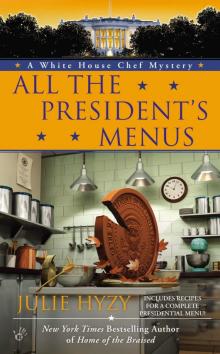 All the President’s Menus
All the President’s Menus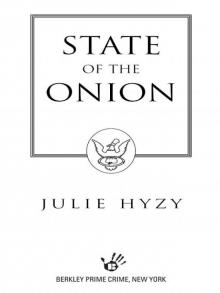 State of the Onion
State of the Onion Grace Sees Red
Grace Sees Red Whitehouse Chef 04 - Grace Under Pressure
Whitehouse Chef 04 - Grace Under Pressure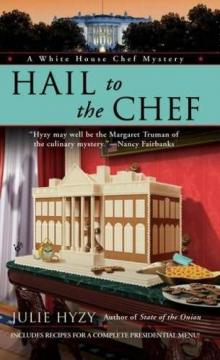 Hail to the Chef
Hail to the Chef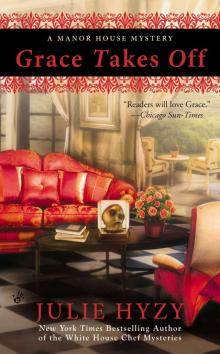 Grace Takes Off
Grace Takes Off Grace Against the Clock (A Manor House Mystery)
Grace Against the Clock (A Manor House Mystery) Grace Cries Uncle
Grace Cries Uncle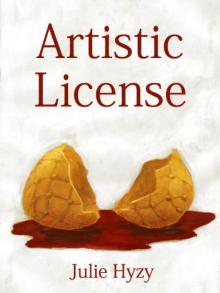 Artistic License
Artistic License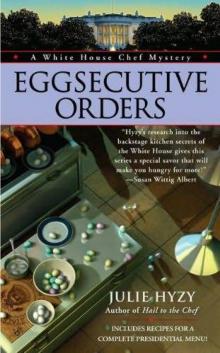 Eggsecutive Orders
Eggsecutive Orders Grace Interrupted
Grace Interrupted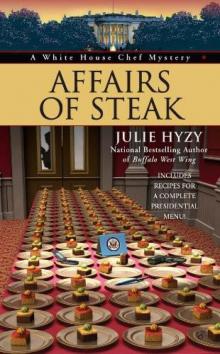 Affairs of Steak
Affairs of Steak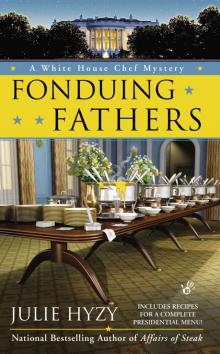 Fonduing Fathers
Fonduing Fathers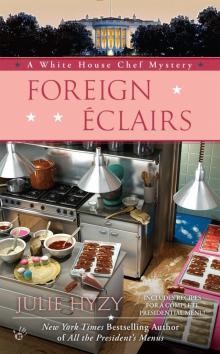 Foreign Éclairs
Foreign Éclairs Virtual Sabotage
Virtual Sabotage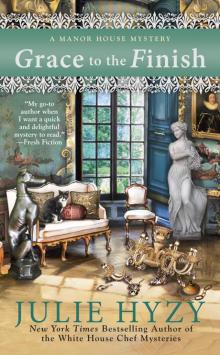 Grace to the Finish
Grace to the Finish